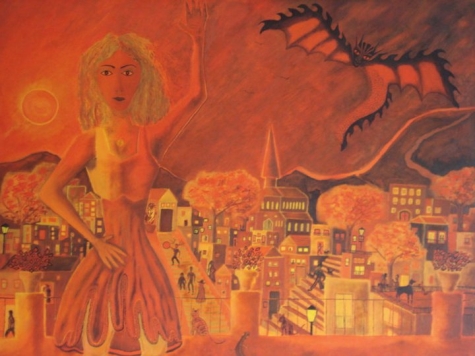Truth
is, I'm in a fallow period. Fallow, like a field in the Bible
awaiting a parable to make me spring me to life. I'm counting on Borges,
fate, luck, the odds, to change my tide, or to release me from laziness.
One
jumpstart is my appropriation and probably misappropriation of this poem. I read it four or five times today, and in each reading made an agreement with Borges that "men" was inclusive, a trope of language, of its time. And then as I copied it out, I was not happy.
I thought, no, Sarah, look for a poem by a woman. And I might have, except for the fact that this is a beautiful, haunting, terrifying, specific delineation. So I just changed the word "men" to the word "women" both times it's used. Borges is larger than that. Equally true is that none of us are larger. Most true: "History of the Night" is remarkable and you must read it. The night, the dark, fear, blindness, ancient braveries, masteries, the heavens in their velvet revolving.
By the way. Luis
de León was a Sixteenth Century Spanish priest. He was a guest of the Inquisition not once but twice, translator (Song of Songs), academic and poet.
History
of the Night
Down
through the generations
women
built the night.
In
the beginning it was blindness and sleep
and
thorns that tear the naked foot
and
fear of wolves.
We
shall never know who forged the word
for
the interval of shadow
which
divides the two twilights;
we
shall never know in what century it stood as a cipher
for
the space between the stars.
Other
women engendered the myth.
They
made it the mother of the tranquil Fates
who
weave destiny,
and
sacrificed black sheep to it
and
the cock which presages its end.
The
Chaldeans gave it twelve houses;
infinite
worlds, the Gateway.
Latin
hexameters gave it form
and
the terror of Pascal.
Luis
de León
saw it in the fatherland
of his
shuddering soul.
Now we
feel it to be inexhaustible
like
an ancient wine
and no
one can contemplate it without vertigo
and
time has charged it with eternity.
And to
think it would not exist
but
for those tenuous instruments, the eyes.
Jorge
Luis Borges, tr. Charles Tomlinson. Waiting for the Night, 1978-1985, in Poems of the Night, Penguin, 2010.

No comments:
Post a Comment